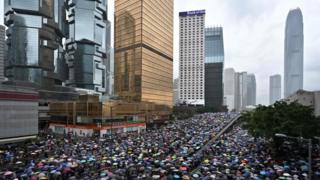Hong Kong extradition row: Will it damage its star status?
 Image copyright Getty Images
Image copyright Getty Images Changes to Hong Kong’s extradition law could hurt the autonomy that has made it one of Asia’s main financial hubs.
The government is seeking to allow extraditions to mainland China, saying it makes sure Hong Kong remains a “safe city for residents and business”.
The proposed changes led to widespread protests in Hong Kong this week and sparked some of the worst violence seen there in decades.
Many worry that Hong Kong’s status as a global financial centre is at risk.
“The passage of the proposed legislation would undermine Hong Kong’s status both as a hub for multinational firm operations and as a global financial centre,” said Nicholas Lardy, a senior fellow at the Washington-based think tank Peterson Institute for International Economics.
So what are the proposed changes?
The changes will allow for extradition requests from authorities in mainland China, Taiwan and Macau for suspects accused of criminal wrongdoings, such as murder and rape.
Officials have said Hong Kong courts will have the final say whether to grant such extradition requests, and suspects accused of political and religious crimes will not be extradited.
Several commercial offences such as tax evasion have been removed from the list of extraditable offences.
But Hong-Kong based lawyer Antony Dapiran said this does not mean business people are “off the hook”.
“Even though there is some reassurance in the business community that those white collar crimes have been excluded… that doesn’t necessarily mean that people are therefore free of risk,” Mr Dapiran said.
“There are many other ways that someone can be extradited under the current bill for offences other than the offence that they are actually wanted (for).”
What has the business reaction been so far?
Companies have proved reluctant to openly speak about the extradition bill for fear that their businesses in mainland China could suffer consequences.
Pushing the bill through would risk “shooting Hong Kong in the foot,” Tara Joseph, president of The American Chamber of Commerce in Hong Kong, said in a recent newspaper interview.
Both the British Chamber of Commerce and the Australian Chamber of Commerce in Hong Kong, refused to comment when contacted by the BBC.
Andrew Coflan, analyst at New York-based political risk consultancy Eurasia Group, said that the foreign business community was worried.
“Hong Kong has served as a gateway to Asia for flows of goods and capital,” said Mr Coflan.
“But the passage of the extradition bill would turn it from a special legal entity into just another Chinese city, from a corporate risk perspective. The key risk is one of diverted or withdrawn investment.”
What happens to its special status?
The US, which is embroiled in a trade and technology dispute with China, has been vocal about its concerns surrounding the Hong Kong extradition bill.
The US expressed “grave concern” about the Hong Kong government’s proposed amendments which “could damage Hong Kong’s business environment” and subject American citizens there “to China’s capricious judicial system,” Morgan Ortagus, spokesman at the US State Department said during a recent news briefing.
“The continued erosion of the ‘One Country, Two Systems’ framework puts at risk Hong Kong’s long-established special status in international affairs,” he said.
In 1984, Britain and China signed an agreement where Hong Kong would enjoy “a high degree of autonomy” when it returned to China in 1997 under the principle of “one country, two systems.”
As a result, Hong Kong has its own legal system and borders, and rights including freedom of assembly and free speech are protected.
In the US, Hong Kong’s special status is recognized under the US Hong Kong Policy Act but this now appears to be under scrutiny.
US lawmakers have introduced a bill to amend the Hong Kong Policy Act of 1992. The amendment requires the US Secretary of State to “issue an annual certification of Hong Kong’s autonomy to justify special treatment” by the US.
“The bigger issue is probably that the global perception of Hong Kong as a separate part of China is under threat. And that includes official recognition of Hong Kong as a separate customs, immigration, tax and legal jurisdiction,” said David Webb, editor of Webb-site.com and long-time resident of Hong Kong.
“If Hong Kong loses its separate status then, for example, all of the duties that America has applied to Chinese exports would apply to Hong Kong exports. And any prohibitions on transfers of high grade technology to China would apply to Hong Kong as well.”
Any impact on Hong Kong’s economy?
Hong Kong saw its worst violence in decades this week, with some government offices and banks closing due to the disruption.
Standard Chartered said on Friday the branches which were closed earlier in the week would resume operations.
Some analysts expect protests to continue as long as the bill is being considered. Further protests are expected on Sunday.
But Capital Economics, pointing to the fallout of the 2014 Occupy Hong Kong protests, expects the economic impact to be limited.
“The 2014 Occupy Hong Kong protests provide a useful benchmark. They brought gridlock to large parts of Hong Kong Island for over 70 days, but there was no noticeable effect on either retail sales or tourism arrivals,” it said in a research note.
“So even if the current protests last for several weeks, the impact on the economy is likely to be minimal. We are not changing our GDP growth forecasts for this year.”
However, analysts say other places in Asia like Singapore stand to benefit if the proposed changes go through, undermining Hong Kong’s status as a global financial hub.
“The main beneficiary of this development is likely to be Singapore, which has a strong legal framework and no extradition agreement with China,” said Mr Lardy from the Peterson Institute.



